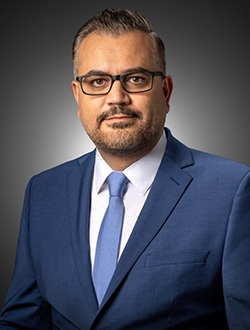When Hady Abdulhady began exploring Executive MBA programs, he was driven by a desire to advance into a leadership role within the energy sector. As director of business development and sales for thyssenkrupp Uhde – a company renowned for its expertise in hydrogen and low-carbon chemical technologies – his focus was on the hydrogen and ammonia business unit prior to the program.
Since graduating in 2023, he has taken on responsibility for the entire business department and sales for the technology portfolio and is leading a team that covers eight product lines.
“The EMBA equipped me with the skills to lead the business development and sales strategy at my company,” said Abdulhady, who lives in Houston.
Read on to learn more about how the EMBA in Energy has helped Abdulhady advance in his career.
Why did you seek out an EMBA in Energy?
My decision to pursue an EMBA in Energy was driven by a desire to advance into a leadership role within the energy sector. I explored various EMBA programs offered by prestigious universities across the United States. The OU EMBA in Energy stood out due to its unique curriculum tailored to prepare leaders for the evolving landscape of the energy transition. Given my background in a company at the forefront of low-carbon technologies, this program seemed perfectly aligned with my career objectives, offering an opportunity to deepen my understanding of the technical and business aspects of the energy industry.
Why did you choose OU’s EMBA in Energy – Renewables track over other MBAs?
My decision to opt for the Renewables track within the EMBA program was twofold. Renewable energy represents the front end of the value chain of green chemicals, a sector directly relevant to my professional interests. Secondly, it’s a unique program that offers the knowledge necessary to spearhead future energy industry developments.
How has earning this EMBA contributed to your growth as an energy professional?
The EMBA in Energy significantly contributed to my professional development by providing a holistic understanding of the energy industry. It broadened my perspective, deepening my insights into the financial, regulatory, and strategic dimensions of the energy sector. The program also honed my skills in leadership and strategic management, essential for navigating the complex and evolving energy landscape.
Affordability is often a major concern when it comes to education. What return have you seen from your investment of money and time to earn this degree?
I viewed the EMBA in Renewable Energy as a strategic investment in my professional future. The program represented an investment of my own time, effort, and financial resources. The knowledge and capabilities gained through this educational journey have proven to be invaluable in my career progression, justifying the investment.
You work in the areas of hydrogen and ammonia. Can you talk a bit about the importance of those two products in the energy transition?
My role in the hydrogen and ammonia technologies sectors is at the forefront of the ongoing global energy transition. Hydrogen is increasingly being recognized as a crucial element in the shift toward low-carbon energy, acting as a versatile energy carrier. Ammonia, being an effective way to transport hydrogen, plays a pivotal role in the global energy market. My work involves transforming both hydrocarbons and renewable energy into hydrogen and clean chemicals, which are then used in various applications including transportation and power generation. This work is not only professionally rewarding but also contributes significantly to the advancement of sustainable energy solutions and creating a future with less carbon emissions.
Please share anything else you would like about the program or your experience.
The EMBA program was a thoroughly enriching experience. It offered a unique blend of academic knowledge and practical insights, with instructors drawn from various sectors of the energy industry. I was fortunate to be part of a diverse cohort of professionals in my class who brought a wealth of perspectives, greatly enhancing the learning experience. The program director, Professor Dipankar Ghosh, did a phenomenal job in keeping the curriculum up-to-date and responsive to the industry's needs by actively seeking and incorporating feedback for continuous improvement.


